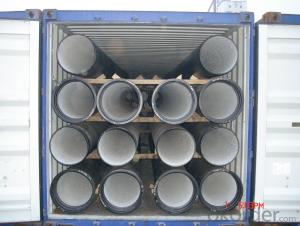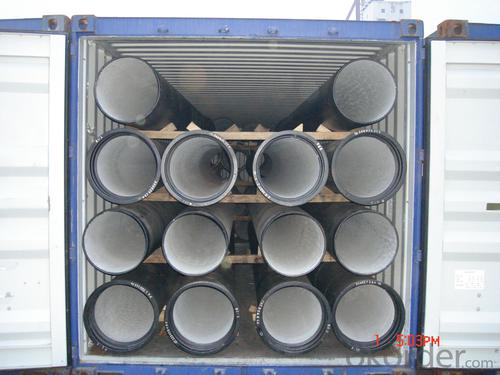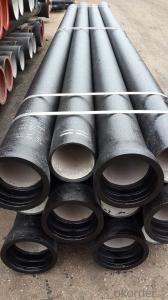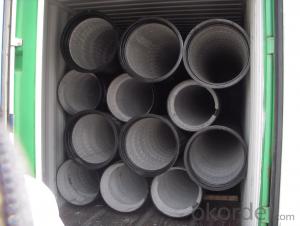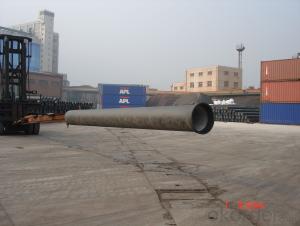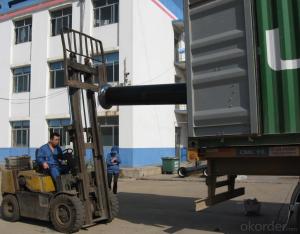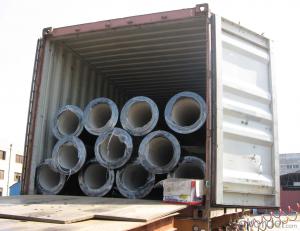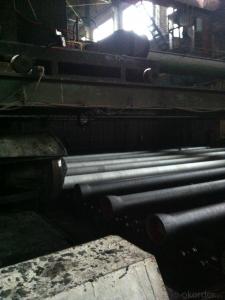DUCTILE IRON PIPE AND PIPE FITTINGS C CLASS DN700
- Loading Port:
- Tianjin
- Payment Terms:
- TT OR LC
- Min Order Qty:
- 23 pc
- Supply Capability:
- 3000 pc/month
OKorder Service Pledge
OKorder Financial Service
You Might Also Like
· Material : Ductile Cast Iron
· Size Range : DN 80mm to DN 2000mm
· Unit Effective Length : 6m or 5.7m
· Manufacture Standard: ISO 2531:1998/ EN 545:2006/EN 598:2007
· Annual capacity : 200,000 tons
· Coating Exterior: Zinc 130g/m2 according to ISO 8179-1 and bitumen coating 70 microns.
· Cement Interior: Portland Cement/ High Alumina Cement/ Sulphate Resisting Cement Lining according to ISO 4179
· Special requirements on external coating and internal lining can be applied
· We also provide accessories such as SBR/EPDM rubber gaskets, lubricant paste, pipe caps, PE sleeves, etc.
Additional Parts:
Each pipe is strictly inspected according to related standard to ensure permanently high performance.
Easy Installation at site and service free for life
Long Service Lifespan
Quotation will arrive you within 24hours once we get your inquiry.
We guarantee offering you a competitive price.
A copy of original inspection reports of pipes will be offered after shipment.
Photos of loading process will be sent to the customer after shipment effect.
We will follow-up the delivery progress after shipment effect and update to the customer on weekly basis.
- Q: Are ductile iron pipes suitable for landfill leachate collection?
- Ductile iron pipes are indeed appropriate for collecting landfill leachate due to their excellent corrosion resistance, which is essential when dealing with corrosive substances present in the leachate. Additionally, these pipes possess remarkable strength and durability, enabling them to endure the pressure and stress exerted by the leachate collection system. Moreover, their ease of installation and maintenance is well-known, rendering them a pragmatic option for landfill leachate collection systems. In conclusion, ductile iron pipes possess the requisite properties and traits to efficiently and effectively gather landfill leachate.
- Q: What is the expected joint tightness for ductile iron pipes?
- The expected joint tightness for ductile iron pipes is typically high due to the robustness of the material and the quality of the jointing methods used, such as rubber gaskets or mechanical couplings. This ensures a reliable and leak-free performance in various applications.
- Q: What are the typical pressure surge protection measures for ductile iron pipe?
- There are several typical pressure surge protection measures for ductile iron pipe that help ensure its integrity and longevity. These measures include: 1. Surge tanks: Surge tanks are commonly used to absorb pressure surges and minimize their impact on the ductile iron pipe. These tanks are typically installed at critical points in the pipeline system, such as at pump stations or near valves, to provide a reservoir for excess pressure. 2. Air release valves: Air release valves are essential components in ductile iron pipe systems that help release trapped air and prevent the formation of air pockets. These valves help maintain a stable pressure within the pipe and reduce the risk of pressure surges during operation or sudden changes in flow. 3. Pressure relief valves: Pressure relief valves are designed to protect ductile iron pipes by releasing excess pressure when it exceeds a predetermined threshold. These valves are typically installed at strategic locations in the pipeline system and are set to open when the pressure exceeds a safe limit, diverting the excess pressure to prevent damage to the pipe. 4. Surge suppressors: Surge suppressors are devices that are installed in ductile iron pipe systems to absorb and dissipate pressure surges. These devices act as shock absorbers, reducing the impact of pressure fluctuations and preventing damage to the pipe. Surge suppressors are particularly effective in situations where pressure surges are frequent or severe. 5. Pipe wall thickness: Another crucial measure for pressure surge protection in ductile iron pipe is ensuring an appropriate pipe wall thickness. By selecting a pipe with the correct wall thickness, engineers can ensure that the pipe can withstand the pressure surges it may encounter during operation. This helps prevent pipe failure or rupture due to excessive pressure. It is important to note that the specific pressure surge protection measures implemented for ductile iron pipe may vary depending on the specific application, pipe size, operating conditions, and regulatory requirements. Consulting with experts in pipeline engineering and design is crucial to determine the most suitable pressure surge protection measures for a particular ductile iron pipe system.
- Q: Can ductile iron pipe be used for potable water systems?
- Potable water systems can utilize ductile iron pipe. Ductile iron, a form of cast iron, stands out for its strength, durability, and ability to handle high pressure. It is also resistant to corrosion, making it suitable for water distribution systems. Due to its long lifespan and minimal upkeep requirements, ductile iron pipe is frequently employed in potable water systems. Various standards organizations, such as the American Water Works Association (AWWA), have approved its use in potable water applications. However, it is crucial to adhere to the correct standards and regulations during the manufacturing and installation of ductile iron pipe for potable water systems to guarantee the safety and quality of the water supply.
- Q: What are the different types of fittings available for ductile iron pipe?
- There are several different types of fittings available for ductile iron pipe. These fittings are designed to connect, redirect, or branch off the pipe in various configurations to suit different plumbing or piping systems. One common type of fitting is the flanged fitting, which features a flange or lip on one end that allows for easy bolted connection to another flanged component. Flanged fittings are commonly used in applications where a tight seal is required, such as in water or sewage systems. Another type of fitting is the mechanical joint fitting, which utilizes a gasket and a set of mechanical bolts to create a secure connection between two pieces of pipe. Mechanical joint fittings are often used in underground water or sewer systems. Push-on fittings are another popular option for ductile iron pipe. These fittings have a rubber gasket that is compressed onto the pipe, creating a watertight seal. Push-on fittings are quick and easy to install, making them ideal for applications where speed and efficiency are important. For situations where a change in direction is required, ductile iron pipe fittings such as elbows or bends are used. These fittings are designed to smoothly change the direction of the pipe without causing any significant flow restrictions. Additionally, there are saddle fittings available for ductile iron pipe. These fittings are used to create a branch connection on an existing pipeline without the need for cutting or welding. Saddle fittings are commonly used in irrigation or fire protection systems. Overall, the different types of fittings available for ductile iron pipe provide a range of options to meet the specific needs of different plumbing or piping systems. Whether it's flanged fittings for a tight seal, mechanical joint fittings for underground applications, push-on fittings for quick installation, or specialized fittings like elbows or saddle fittings, each type serves a specific purpose in the overall plumbing or piping system.
- Q: What are the different types of restrained joints for ductile iron pipe?
- Ductile iron pipe has several types of restrained joints available to prevent pipe separation or movement caused by internal pressure, external forces, or ground movement. The commonly used restrained joints for ductile iron pipe are as follows: 1. Mechanical Restrained Joint: This joint employs mechanical devices like bolts, nuts, and gaskets to secure the pipe. It typically consists of a gland, a gland follower, and a restraint ring. The gland and gland follower compress the gasket against the pipe, while the restraint ring provides additional support and resistance against movement. 2. Push-on Restrained Joint: This joint uses a rubber gasket that compresses when the two pipe ends are pushed together. The gasket not only provides a tight seal but also acts as a restraint against movement. Some push-on restrained joints may include additional mechanical devices to enhance the restraining capability. 3. Restrained Flange Joint: This joint combines the characteristics of a flanged joint and a restrained joint. It involves a flanged pipe end that is bolted to a flange on another pipe or fitting. The bolts and nuts offer the mechanical restraint, while the flange connection ensures a secure and leak-free joint. 4. Restrained Coupling Joint: This joint is a variation of the mechanical restrained joint. It utilizes a coupling that is either bolted or clamped around the pipe ends to provide the necessary restraint. The coupling may also have a gasket to ensure a tight seal. 5. Restrained Socket Joint: This joint is similar to the push-on restrained joint, but it incorporates additional mechanical devices to enhance the restraining capability. The socket end of the pipe is typically designed to receive a pipe spigot, which is then secured using bolts, clamps, or other mechanical devices. These diverse types of restrained joints for ductile iron pipe offer different levels of restraint and are chosen based on the specific requirements of the application. They guarantee the stability and integrity of the pipeline system, minimizing the risk of leaks, pipe separation, or movement.
- Q: Does the cast iron have size 250? What's the performance?
- Ductile iron does not have size 250. Ductile iron is the beginning of QT, QT400-15, QT450-10, QT500-7 is the general use of nodular cast iron brand. Nodular cast iron welding can be determined, this should be in some high strength cast iron equipment used more, the tensile strength of normally ductile cast iron welding in welding is higher, is worse than the grey cast iron, it is actually very difficult to distinguish with the naked eye is ductile iron or cast iron the iron in the repair equipment, we usually use WE777 special cast iron electrode universal wide welding, but it is only for maintenance use, the effect is really good, reducing the risk of cracking and high strength welding rod matching to ensure the strength of welding seam.
- Q: Can the sealing ring of ductile iron pipe be reused?
- It is better not to have used things, easy aging, sealed, the best to use new
- Q: Can ductile iron pipes be used in areas with high soil acidity and alkalinity?
- Areas with high soil acidity and alkalinity generally allow for the use of ductile iron pipes. However, it is crucial to consider the specific conditions and take appropriate measures to minimize the potential impact of these soil characteristics on the pipes. In regions with high soil acidity, the acidic conditions can promote corrosion of metal pipes, including ductile iron. To prevent this, protective measures such as applying an external coating or implementing cathodic protection can be utilized. These measures create a barrier between the pipe and the corrosive environment, thereby extending the pipes' lifespan. Similarly, in areas with high soil alkalinity, the alkaline conditions can affect the performance of ductile iron pipes. Alkaline soils can cause the formation of calcium carbonate deposits, commonly referred to as scale, which can gradually reduce the flow capacity of the pipes. Regular maintenance and cleaning of the pipes can help mitigate the effects of scale accumulation. It is important to note that the suitability of ductile iron pipes in areas with high soil acidity and alkalinity may also depend on the specific grade and quality of the pipes. Manufacturers often provide guidelines and recommendations regarding the use of their products in different environmental conditions. It is advisable to consult with pipe manufacturers or industry experts to ensure the proper selection and installation of ductile iron pipes in such areas.
- Q: What are the advantages of using ductile iron pipe over HDPE pipe?
- Ductile iron pipe offers several advantages over HDPE pipe. Firstly, it has a higher strength and durability, making it suitable for high-pressure and heavy-duty applications. Secondly, it has better resistance to external loads, such as traffic or soil pressure. Additionally, ductile iron pipe has superior fire resistance and is less susceptible to damage from UV rays. Moreover, it has a longer lifespan and requires less maintenance compared to HDPE pipe. Lastly, ductile iron pipe has better flow characteristics, resulting in lower energy consumption for pumping systems.
Send your message to us
DUCTILE IRON PIPE AND PIPE FITTINGS C CLASS DN700
- Loading Port:
- Tianjin
- Payment Terms:
- TT OR LC
- Min Order Qty:
- 23 pc
- Supply Capability:
- 3000 pc/month
OKorder Service Pledge
OKorder Financial Service
Similar products
Hot products
Hot Searches
Related keywords
